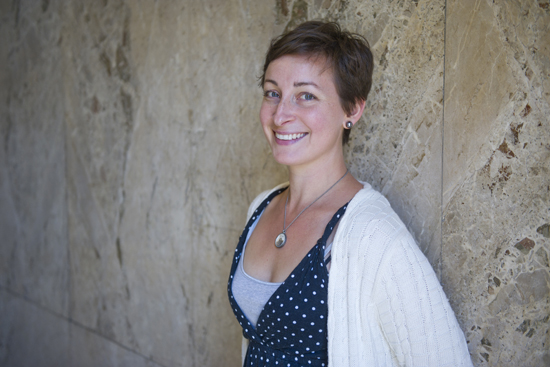Preventing Landslides in Uganda
GRS PhD student named first Moorman-Simon Civic Fellow

Kira Sullivan-Wiley (GRS’16) is the first BU student to be awarded a Moorman-Simon Civic Fellowship for her work in preventing environmental disasters in Uganda. Photo by Cydney Scott
In June 2012, a landslide in eastern Uganda killed dozens and left hundreds homeless. Scores of people had been buried alive in a similar disaster in the region two years earlier. Climate change is expected to only increase the occurrence of landslides caused by heavy rains in the region.
Kira Sullivan-Wiley (GRS’16) is working to prevent such catastrophes by studying Ugandans’ awareness of the risks posed by landslides and other natural disasters and then forming solutions in partnership with agencies on the ground there that could save lives and livelihoods. A PhD candidate in the College of Arts & Sciences department of earth and environment, Sullivan-Wiley was recently awarded the 2014 Moorman-Simon Civic Fellowship for her research.
Created last year by a gift from University overseer Ruth Moorman (CAS’88, SED’89,’09) and her husband, Sheldon Simon, the fellowships are awarded to outstanding doctoral students “whose research and scholarship involves vigorous engagement with civic life and seeks to establish a close partnership with the community to solve critical problems,” according to the Office of the Provost. The long-term goal of the Moorman-Simon Civic Fellowships is to establish a “generation of scholars in the academy who are committed to civic engagement” around the world. The award provides funding for tuition, fees, and a stipend for two years.
“We were extremely pleased with the caliber of candidates we saw in this first year, all of whose work exemplifies the spirit of civic engagement Ruth Moorman and Sheldon Simon hoped to spark through these fellowships,” says Timothy Barbari, associate provost for graduate affairs and a College of Engineering professor of biomedical engineering. “All of these students, and Kira in particular, are performing outstanding, important work in a host of diverse areas and truly helping to effect positive change at the local, national, and global level.”
Uganda has one of the highest population growth rates in the world, and many Ugandans resort to building homes on unstable, uneven land. As trees are removed to make way for homes and farms, mudslides and floods become more common.
“The population I work with is quite poor in terms of monetary income, and they are located in areas that are vulnerable to natural disasters,” says Sullivan-Wiley, who visited the region for the third time this past summer. “The community is located near a volcanic mountain in Uganda, and so the area has loose volcanic soils and lots of rainfall. As they expand and cultivate areas that have higher risks for mudslides and landslides, they are increasing the likelihood of a disaster.”
Her research examines how to best lessen vulnerability to a disaster, something referred to in academic terms as “disaster risk reduction.” She specifically does this by studying the roles that organizations such as the Uganda Red Cross Society and the American Red Cross play in increasing awareness and risk mitigation behaviors. She then will suggest ways the programs can improve getting their message across.
Not much is known about the ways that disaster risk reduction interventions shape the beliefs and land management of a community, so Sullivan-Wiley also interviewed at length 426 farmers in the region to learn more about how they use the land. “We asked the individuals about the 18 organizations in the area that are dedicated to helping farmers—things like the extent to which they were involved, and whether they felt they could really trust the organizations,” she says. “We’re trying to triangulate on what is keeping these people from doing the things that are recommended that they do.”
When she applied for the Moorman-Simon Civic Fellowship last March, Sullivan-Wiley submitted her dissertation outline, a letter of nomination from her advisor, Anne Short, a CAS assistant professor of earth and environment, and a letter of support from the Red Cross. A faculty committee chaired by Barbari recommended candidates to the provost to select.
Short describes her student as an ambitious self-starter. While it is common for students in the department to work on research projects designed and funded by their primary advisor, Sullivan-Wiley “turned down two years of guaranteed funding to instead pursue an unfunded, independent project,” Short wrote in her recommendation letter. “Working on my project, studying conservation in Massachusetts, would have allowed Kira to capitalize on my connections in the field and to complete her doctoral work without having to worry about external funding, but would have precluded her from working on development issues. In choosing to work in Uganda, Kira has had to assume responsibility for building her own network and connections in the field and securing funding to support her work.…Kira has further impressed me with her passion, initiative, and ability to translate ideas into action.”
Sullivan-Wiley says the fellowship aligns well with her longer-range career plan. “My doctoral work is an example of the type of work I intend to conduct throughout my career—work that builds partnerships with practitioners and communities, links academic knowledge to action, and focuses on the effects of development programs on people who struggle with vulnerability to disasters,” she says.

Comments & Discussion
Boston University moderates comments to facilitate an informed, substantive, civil conversation. Abusive, profane, self-promotional, misleading, incoherent or off-topic comments will be rejected. Moderators are staffed during regular business hours (EST) and can only accept comments written in English. Statistics or facts must include a citation or a link to the citation.